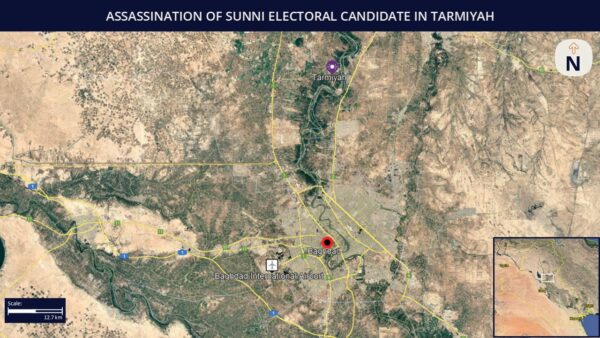15
Oct 2025
14:11 UTC
Iraq Alert: Adhesive car bomb attack kills Sunni election candidate in Tarmiyah, north of Baghdad, on October 15; shows elevated risk of political violence ahead of elections
Current Situation:
- According to the Baghdad Operations Command, an adhesive bomb attached to the vehicle of Safa al-Mashhadani detonated during the early morning hours (local time) of October 15 in Tarmiyah, located approximately 30km north of Baghdad.
- The explosion killed al-Mashhadani, a politician of the Sunni National Sovereignty Alliance (al-Siyada) who was a Baghdad Provincial Council member and candidate running for the November 11 parliamentary elections.
- Four other passengers in the car, reportedly his bodyguards, were wounded.
- Al-Siyada lawmaker Aisha Ghazal Al-Masari denounced the assassination, stating that the perpetrators were seeking to sow “chaos and lawlessness.” She called on authorities to identify and prosecute them.
- The Baghdad Operations Command announced the launch of an investigation into the assassination.
Source: Baghdad Operations Command
Assessments & Forecast:
- The incident marks the first assassination of a candidate since campaigning for the election commenced on October 3. It is highly notable given that targeted assassination attempts against politicians using means such as adhesive car bombs have become rare in Iraq in recent years, particularly in the Baghdad region, where the security environment has stabilized overall.
- Islamic State (IS) sleeper cells retain a foothold in the Sunni-populated Tarmiyah region. It therefore cannot be excluded that IS operatives are responsible for the IED attack. This would serve the jihadist group’s objective to exacerbate sectarian tensions between Sunnis and Shiites and destabilize the security environment around the capital ahead of the November 11 ballot.
- That said, the development comes amid heightened political tensions in the run-up to the November 11 vote, with several incidents underscoring how this can translate into security incidents. For example, in September, the Saraya al-Salam militia mobilized in southern Iraq’s Basra after a prominent activist accused MP Sukhail al-Malik from the State of Law Coalition of plotting to assassinate Sadrist Movement leader Muqtada al-Sadr with a drone. Additionally, gunfire was reported during a Kurdistan Democratic Party (KDP) rally in Kirkuk on October 11. This mirrors a long-standing trend in Iraq, wherein politically motivated violence has surged during periods of heightened political tensions in the past. For instance, in January 2022, IED explosions targeted party offices of the Taqadum and Azm parties in Baghdad, while a rocket attack impacted near the residence of acting Parliament Speaker Mohammed Halbousi in Anbar province.
- These past dynamics render it highly likely that al-Mashhadani’s assassination was politically motivated. This is lent credence by his critical stance toward Iran-backed Popular Mobilization Forces (PMF), including his demand that PMF militias permit the return of Sunni residents they allegedly displaced from Babil province’s Jurf al-Sakhar, a known stronghold of prominent PMF militia Kataib Hezbollah (KH). Al-Mashhadani had reportedly also filed a lawsuit against PMF-linked lawmaker Mustafa Sanad, who allegedly called for the displacement of Sunni Tarmiyah residents following a January 21 explosion of an ammunition depot in the town. In this context, it is plausible that al-Mashhadani’s outspoken stance motivated PMF-linked elements to assassinate him. This may form part of a broader effort to discourage Iraqi politicians from demanding that the government reign in the PMF amid growing US pressure for the disarmament of the Iran-backed Shiite militias.
- FORECAST: Many supporters of the Sunni National Sovereignty Alliance are likely to hold Iran-backed elements responsible for the assassination. Therefore, the attack is likely to heighten tensions between the Sunni bloc, Iran-backed Shiite parties, and their affiliated supporters. This could prompt retaliatory acts of political violence in the coming days amid ongoing campaigning events.
- FORECAST: Authorities will face heightened pressure to identify and hold the perpetrators of the attack accountable, while preventing further incidents from materializing. In this context, security forces may carry out arrest operations targeting suspects in the greater Baghdad area in the coming days. Such raids carry a potential for armed confrontations between security forces and armed suspects, particularly if they target PMF militia members.
- FORECAST: More broadly, the assassination will also increase authorities’ general alertness toward the nationwide risk of security incidents materializing in the context of rising political tensions. Heightened security protocols surrounding campaign events can therefore be expected in order to reduce the risk of such incidents materializing. That said, the widespread proliferation of firearms will limit authorities’ capacity to address this threat effectively. The risk of security incidents amid election events will therefore remain elevated in the run-up to the parliamentary elections across Iraq, culminating in a risk of collateral damage, even in targeted attacks.
Recommendations:
- Those operating or residing in Iraq over the coming weeks are advised to remain cognizant of the prospect of increasing political tensions and associated political violence ahead of the November 11 parliamentary elections. Refrain from discussing politically sensitive topics with unknown individuals.
- Avoid nonessential travel to Baghdad due to the threat of militancy and civil unrest. Contact us at [email protected] or +44 20-3540-0434 for itinerary and contingency support.
- For those conducting essential operations in Baghdad, restrict travel to the Green Zone. Ensure that contingency and emergency evacuation plans are updated.
- Any travel, particularly in outlying areas, ought to be conducted in armored vehicles, with trained security escorts and coordination with authorities. This is due to the prevalence of remaining landmines and the risk of roadside IEDs planted by Shiite militias. If possible, travel by air between Iraqi cities to minimize risks associated with militancy and crime.
- Westerners are advised to maintain a low profile and travel only with trained security personnel given the risk of attacks or kidnappings.
- While traveling, regularly alter itinerary routes and avoid disclosing sensitive information to strangers, including your affiliation with foreign-based firms as your response could attract a negative reaction from locals.
COUNTRY RISK LEVEL
High
AFFECTED AREA
Tarmiyah, Iraq
INCIDENT RISK LEVEL
Extreme
STRENGTH OF SOURCE
Confirmed
Current Situation:
- According to the Baghdad Operations Command, an adhesive bomb attached to the vehicle of Safa al-Mashhadani detonated during the early morning hours (local time) of October 15 in Tarmiyah, located approximately 30km north of Baghdad.
- The explosion killed al-Mashhadani, a politician of the Sunni National Sovereignty Alliance (al-Siyada) who was a Baghdad Provincial Council member and candidate running for the November 11 parliamentary elections.
- Four other passengers in the car, reportedly his bodyguards, were wounded.
- Al-Siyada lawmaker Aisha Ghazal Al-Masari denounced the assassination, stating that the perpetrators were seeking to sow “chaos and lawlessness.” She called on authorities to identify and prosecute them.
- The Baghdad Operations Command announced the launch of an investigation into the assassination.
Source: Baghdad Operations Command
Assessments & Forecast:
- The incident marks the first assassination of a candidate since campaigning for the election commenced on October 3. It is highly notable given that targeted assassination attempts against politicians using means such as adhesive car bombs have become rare in Iraq in recent years, particularly in the Baghdad region, where the security environment has stabilized overall.
- Islamic State (IS) sleeper cells retain a foothold in the Sunni-populated Tarmiyah region. It therefore cannot be excluded that IS operatives are responsible for the IED attack. This would serve the jihadist group’s objective to exacerbate sectarian tensions between Sunnis and Shiites and destabilize the security environment around the capital ahead of the November 11 ballot.
- That said, the development comes amid heightened political tensions in the run-up to the November 11 vote, with several incidents underscoring how this can translate into security incidents. For example, in September, the Saraya al-Salam militia mobilized in southern Iraq’s Basra after a prominent activist accused MP Sukhail al-Malik from the State of Law Coalition of plotting to assassinate Sadrist Movement leader Muqtada al-Sadr with a drone. Additionally, gunfire was reported during a Kurdistan Democratic Party (KDP) rally in Kirkuk on October 11. This mirrors a long-standing trend in Iraq, wherein politically motivated violence has surged during periods of heightened political tensions in the past. For instance, in January 2022, IED explosions targeted party offices of the Taqadum and Azm parties in Baghdad, while a rocket attack impacted near the residence of acting Parliament Speaker Mohammed Halbousi in Anbar province.
- These past dynamics render it highly likely that al-Mashhadani’s assassination was politically motivated. This is lent credence by his critical stance toward Iran-backed Popular Mobilization Forces (PMF), including his demand that PMF militias permit the return of Sunni residents they allegedly displaced from Babil province’s Jurf al-Sakhar, a known stronghold of prominent PMF militia Kataib Hezbollah (KH). Al-Mashhadani had reportedly also filed a lawsuit against PMF-linked lawmaker Mustafa Sanad, who allegedly called for the displacement of Sunni Tarmiyah residents following a January 21 explosion of an ammunition depot in the town. In this context, it is plausible that al-Mashhadani’s outspoken stance motivated PMF-linked elements to assassinate him. This may form part of a broader effort to discourage Iraqi politicians from demanding that the government reign in the PMF amid growing US pressure for the disarmament of the Iran-backed Shiite militias.
- FORECAST: Many supporters of the Sunni National Sovereignty Alliance are likely to hold Iran-backed elements responsible for the assassination. Therefore, the attack is likely to heighten tensions between the Sunni bloc, Iran-backed Shiite parties, and their affiliated supporters. This could prompt retaliatory acts of political violence in the coming days amid ongoing campaigning events.
- FORECAST: Authorities will face heightened pressure to identify and hold the perpetrators of the attack accountable, while preventing further incidents from materializing. In this context, security forces may carry out arrest operations targeting suspects in the greater Baghdad area in the coming days. Such raids carry a potential for armed confrontations between security forces and armed suspects, particularly if they target PMF militia members.
- FORECAST: More broadly, the assassination will also increase authorities’ general alertness toward the nationwide risk of security incidents materializing in the context of rising political tensions. Heightened security protocols surrounding campaign events can therefore be expected in order to reduce the risk of such incidents materializing. That said, the widespread proliferation of firearms will limit authorities’ capacity to address this threat effectively. The risk of security incidents amid election events will therefore remain elevated in the run-up to the parliamentary elections across Iraq, culminating in a risk of collateral damage, even in targeted attacks.
Recommendations:
- Those operating or residing in Iraq over the coming weeks are advised to remain cognizant of the prospect of increasing political tensions and associated political violence ahead of the November 11 parliamentary elections. Refrain from discussing politically sensitive topics with unknown individuals.
- Avoid nonessential travel to Baghdad due to the threat of militancy and civil unrest. Contact us at [email protected] or +44 20-3540-0434 for itinerary and contingency support.
- For those conducting essential operations in Baghdad, restrict travel to the Green Zone. Ensure that contingency and emergency evacuation plans are updated.
- Any travel, particularly in outlying areas, ought to be conducted in armored vehicles, with trained security escorts and coordination with authorities. This is due to the prevalence of remaining landmines and the risk of roadside IEDs planted by Shiite militias. If possible, travel by air between Iraqi cities to minimize risks associated with militancy and crime.
- Westerners are advised to maintain a low profile and travel only with trained security personnel given the risk of attacks or kidnappings.
- While traveling, regularly alter itinerary routes and avoid disclosing sensitive information to strangers, including your affiliation with foreign-based firms as your response could attract a negative reaction from locals.


